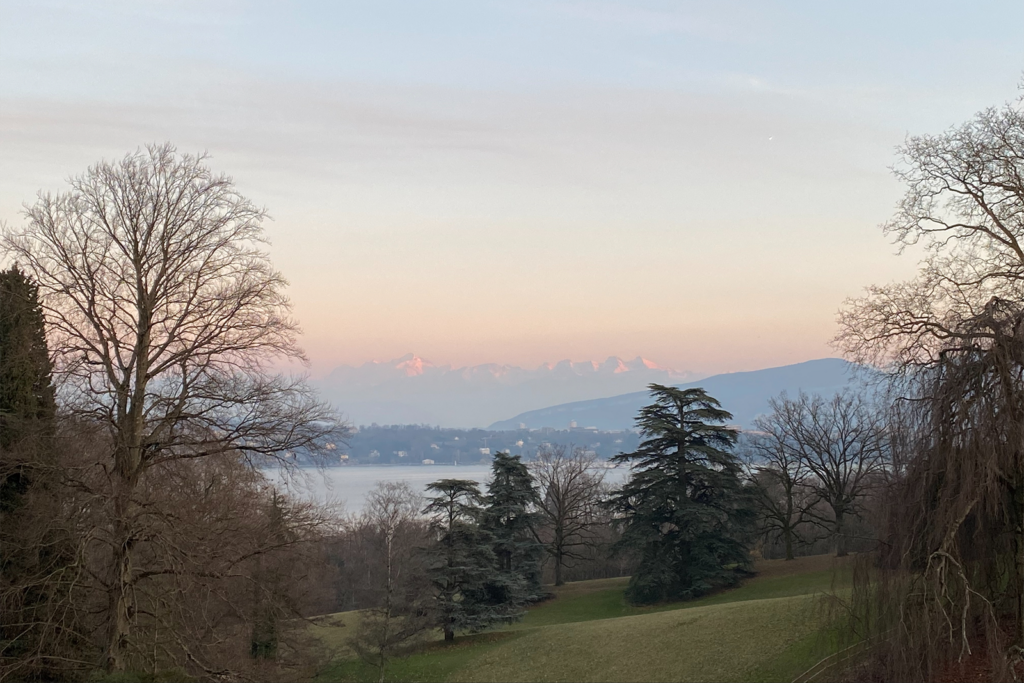Photo credit: Emily Miller
By: Emily Miller, MAGG student
These last couple months in Geneva have given me much to think about and I have not had the chance to completely process everything.
Fortunately, I was able to be here physically in person to get the true Geneva experience. I was very excited to enter the world of multilateralism and global governance. I do not think a younger version of myself would ever have imagined myself here. I grew up in Epekwitk – the traditional and unceded territory of the Mi’kmaq. In English, Epekwitk translates to “lying in the water”. This is a place also known as Prince Edward Island. I write as an anglophone, Canadian citizen, white settler woman, Masters student, from a middle-class family from a rural community. This is my positionality and I want to acknowledge it because it shapes how I understand and experience the world. And I have been thinking specifically about my positionality as I occupy space in Geneva and wondering how the positionality of diplomats as individuals and as representatives of Member States impacts diplomacy, multilateralism, and global governance. This past year in my Masters, I focused my learning on colonialism and decolonization, so I have spent much time thinking about this realm of ideas, which has continued into my internship.
Being in this multilateral space in Geneva, I have found myself thinking about how colonialism has shaped and continues to shape the world. One of my roles as an intern has been to attend information or consulation meetings hosted by UN agencies, where I take notes and write reports summarizing what took place in the meetings to brief colleagues in Ottawa. Being present in rooms where Member States and UN agencies exchange information and make decisions has been a great privilege. The actions taken by Member States and the UN have a very real impact on the lives of people across the world. This is especially true for people who live in fragile and conflict settings, and people who have been displaced or impacted by disaster or disease. The issues discussed and the decisions made at the UN impact everyone, but not equally. Member States have a responsibility towards their domestic population, but the reality is that many of the greatest challenges facing humanity extend beyond any kind of border and for this reason require cooperation, coordination, and engagement.
This brings me to one aspect of global governance I have been reflecting on: cooperation. How do we understand and practice cooperation? What does cooperation look and feel like? How do relationships between actors and the spaces they occupy impact their ability to cooperate? How does the position and positionality of actors impact their ability to cooperate and engage? What is perceived as a threat or barrier to cooperation and why? In Geneva, I have had the opportunity to witness how power dynamics and uneven relationships between Member States, UN agencies, and non-state actors play out in cooperation. It has been fascinating to observe what takes place in a room. I am surprised how much communication can take place through body language and tone. Or how difficult it can be to decipher diplomatic language. Or how you can feel and read the energy of a room. There are lots of cases where I checked with my colleagues to confirm whether or not I understood what took place or asked about the significance of particular statements delivered. In saying all this, there are clearly power dynamics in the room. These dynamics and hierarchical relationships between these actors have layers of complexity, that may or may not be specific to a certain context, like a certain intergovernmental body. I can only reflect on these dynamics from a place of observation, but I have wondered about the approaches to engagement and cooperation between actors.
Recognizing that there are challenges like climate change that require the collective engagement and cooperation from all Member States, I think the approach to the engagement and cooperation matters deeply. From my studies, one way I have tried to decolonize my mind was to seek out other ways of knowing. To seek the perspectives of those voices who have been marginalized, made invisible, and silenced. I raise this point, because I have learned to better understand through Indigenous knowledge the concept of interconnectedness. I read a book in the fall by Suzanne Simard, who shares her story of using science to prove that forests are interconnected, communicating and supporting one another through an intricate root system. Her research challenges the Western idea of competition in nature. Rather, both competition and cooperation exist together in these complex communities. Simard’s research supports knowledge long held by Indigenous Peoples: that we are all connected, we are all one. By integrating spirituality with science, Simard builds upon existing knowledge of Indigenous Peoples and carves a new path for science and policy towards a lens of interconnection and listening more to nature. I wonder how wisdom and lessons from Indigenous knowledge and the earth could be applied to the level of global governance. I think the state of the world demonstrates that change is needed and looking to other ways of knowing and doing is necessary, including to shape how we engage and cooperate with each other, especially considering what is at stake.
I have learned so much during my time with the Permanent Mission of Canada and my experience has given me much to think about. My internship has been complimentary to my studies and given me knowledge, skills, and experience that I know will shape my next steps.
